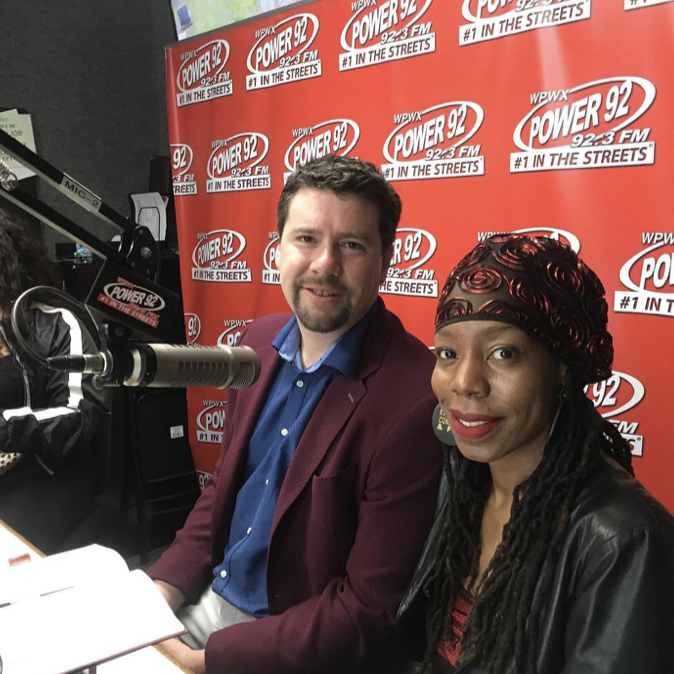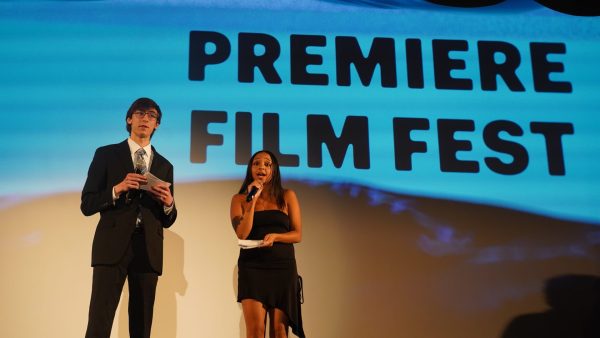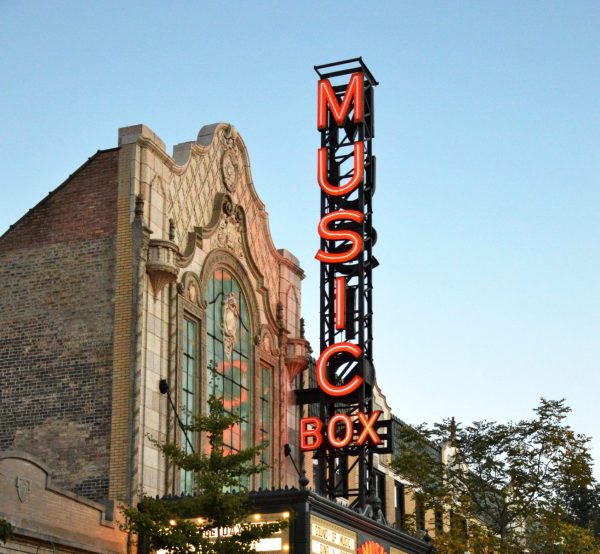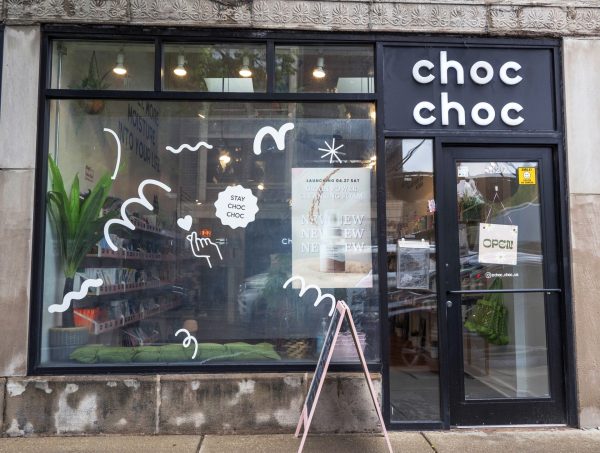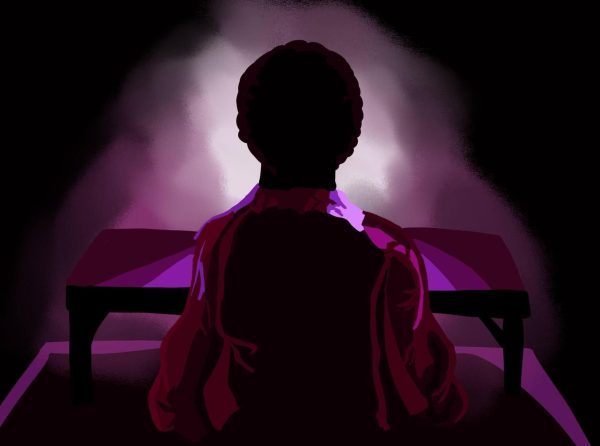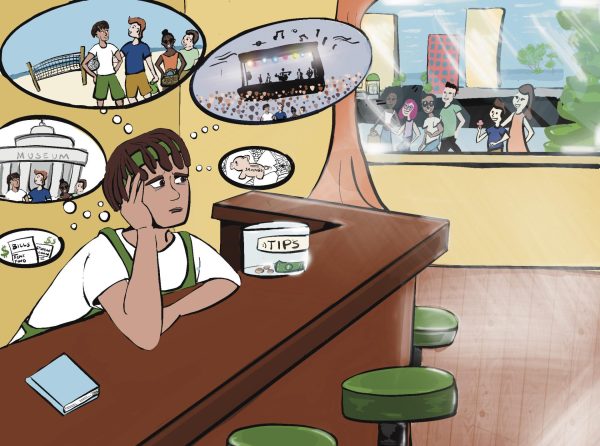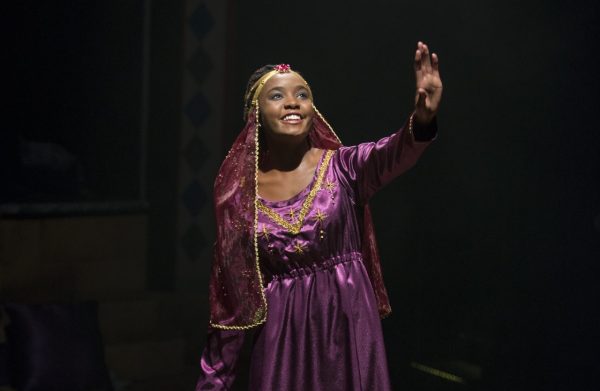Afrika Porter: Chicago’s proud daughter striving for a better city
Photo courtesy of Brian Schodorf
Brian Schodorf and Afrika Porter promoting their documentary “Chicago at the Crossroads” on WPWX Radio.
On a rainy Friday afternoon, Afrika Porter recalled a quote that invigorated her passion for activism: “Malcolm X said that Black women are the most unsupported, left-out-in-the-cold species on the planet. When I heard that, I was so startled. I took that and I said I have to really focus now.”
Porter is not just focused. For over 20 years, she has been dedicated to raising the voices of Black women and men in Chicago.
Porter will receive the Dr. Margaret Burroughs Award for Leadership from the South Side Community Art Center on March 18. This award honors women who have worked to elevate the African diaspora through art, service, or education.
Burroughs has always been a role model for Porter, who now is a role model for many Black youths in Chicago.
“I will have young people there to help me receive the award because it’s not about me as much as it is about them, ” Porter said.
Born and raised in the South Side, Porter is an activist, speaker, business owner, filmmaker and teacher whose mission is community leadership.
She is the youngest of six children born to John and June Porter. Her mother was a teacher and her father was a prominent pastor and sociology professor at the University of Chicago.
“Rev. Dr. Kwame John R. Porter and my mom June Porter have worked in civil rights and Black liberation causes for over 70 years,” Porter said. “I learned from the best.”
Her father was Dr. Martin Luther King Jr.’s first Southern Christian Leadership Conference (SCLC) chapter president for Chicago as well as one of the founding members of the National Rainbow Push Coalition.
With an upbringing shrouded in intellectualism and activism, Porter said she has always been exposed to justice, peace, equality and human rights.
Revin Fellows, activist and longtime friend of the Porter family, said that Porter is well-rounded in her activism because of the influential role models she grew up with.
“She cultivates that history of who she is and where she comes from with pride,” Fellows said. “Her name is Afrika, and she carries herself like she’s the motherland.”
Ancestral heritage and cultural pride ground Porter in her many professional endeavors. She is often seen in colorful cultural dress that expresses the pride she feels being African American.
Fellows said that knowing the history and culture of Black Chicago is a key part of surviving as a community activist and why Porter is so well-respected and successful.
“There is no room she can’t get in,” Fellows said. “She can go from the streets to the suites.”
Despite her large network of connections who support and respect her, Fellows commended Porter for her humility and work ethic.
Porter’s activism for Black representation is not restricted to office hours. She is one of 12 people who fought to change what has been known for decades as Lake Shore Drive to DuSable Drive, after Jean Baptiste Point DuSable, a Black man of Haitian descent who was the first permanent non-indigenous settler of Chicago.
She and her fellow activists are in the process of erecting a 25-foot statue on Michigan Avenue to commemorate DuSable and his role in Chicago’s history.
Educating people about Chicago’s rich history is the premise for Porter’s work in film. In 2016, she began working as an executive producer on the Emmy-award-winning documentary “Chicago at the Crossroad.”
“She was somebody who understood Chicago and why certain communities have experienced violence and poverty,” said Brian Schodorf, director of “Chicago at the Crossroad.”
The documentary explains the origins of the public housing crisis in Chicago and examines the violence, poverty, and skyrocketing murder rate that has particularly affected the South Side.
Schodorf said Porter’s work as an executive producer was essential for the film’s success because she viewed the subject matter through the lens of her firsthand experience. He praised her as a respected member of the community who brought increased credibility to the film.
“The fact that people in the community trust her was a huge deal and making this happen,” Schodorf said. “She was vital in making sure that the film was accurate and carried the integrity that was needed.”
In 2014, Porter started her own public relations firm called Afrika Enterprises, created to promote people, businesses, art, and activism in the Black community.
Around the time Afrika Enterprises was established, Porter said that negativity online motivated her to showcase positivity.
“YouTube was flooded with ignorance,” Porter said. “Black people fighting each other, Black people arguing with each other and Black people killing each other. These were not things I saw in my life.”
Porter has worked to counter misrepresentations and generalizations about the Black community through public relations and consulting for nearly 10 years, working with people from the rappers to educators, business owners and entrepreneurs.
“Afrika is part of the ecosystem of community partners for our movement,” said DeJuan Kea, CEO of FBRK Brands, a non-profit organization that works with Afrika Enterprises on community promotion.
“She has a very diverse skill set,” Kea said. “I see a woman that can, not just move, but excel and dominate different industries.”
Above all, Porter’s generous spirit and strong work ethic have made her a role model for many young people.
“She covers a lot of areas, role modeling for young Black girls and being a much-needed light for Black men,” Fellows said.


